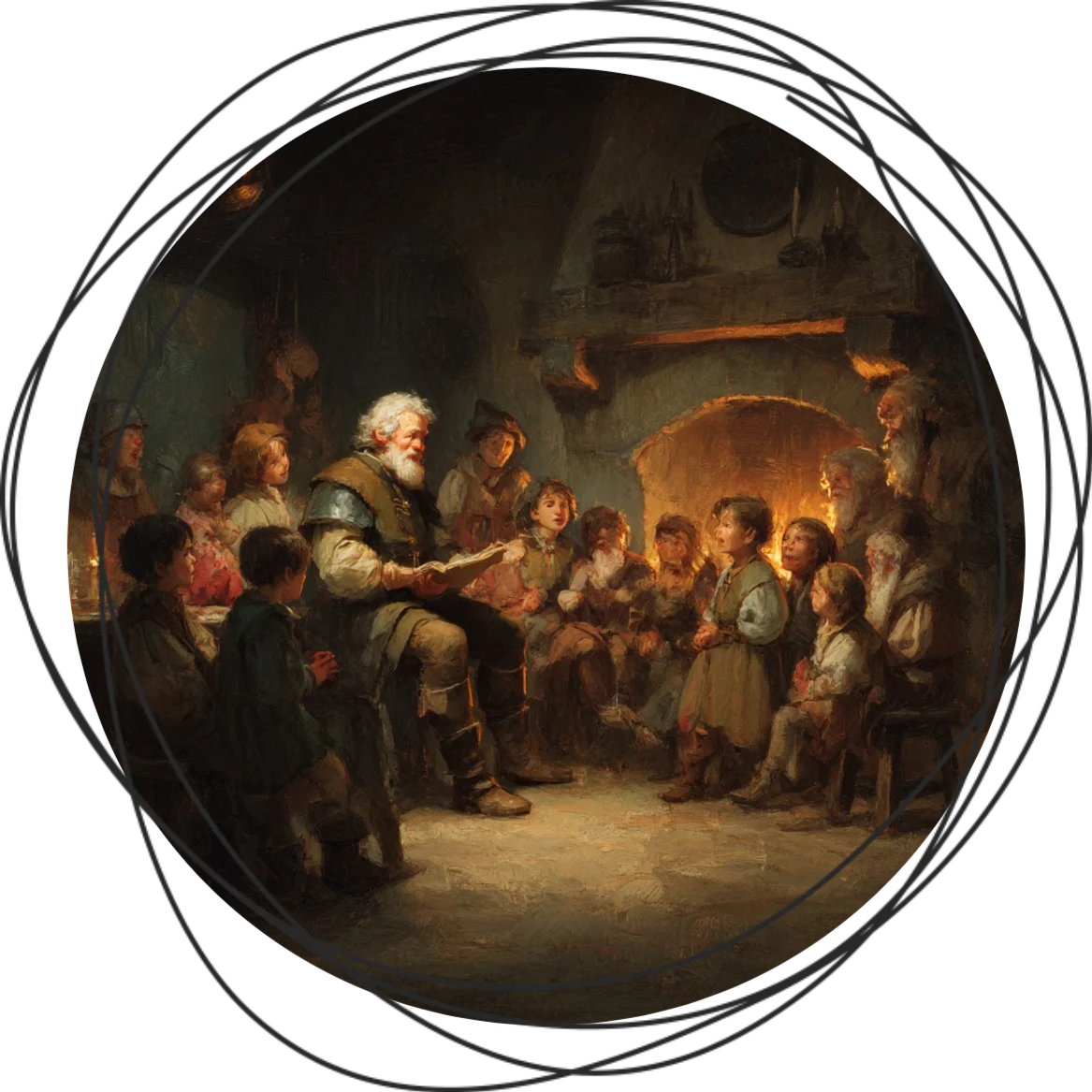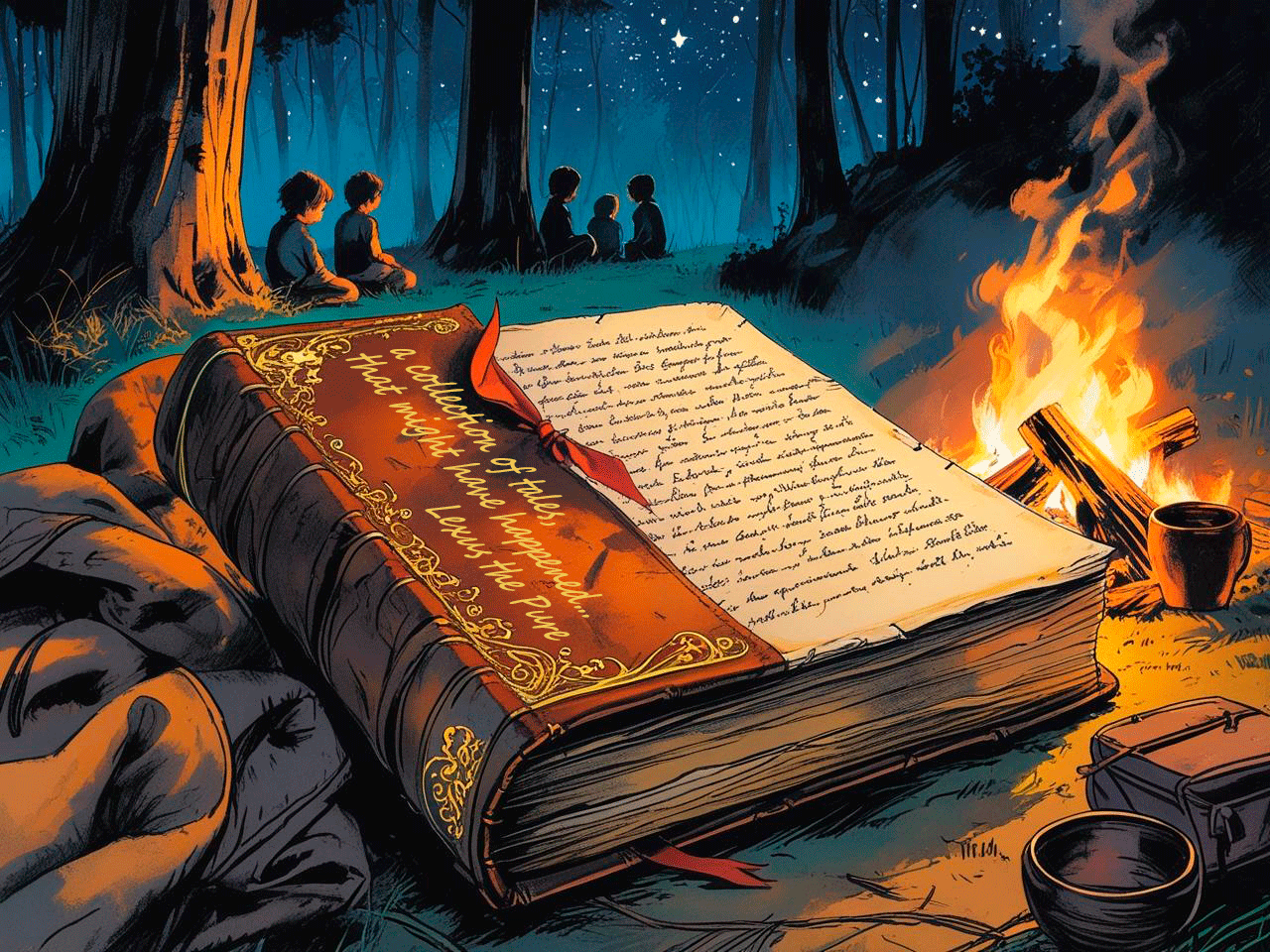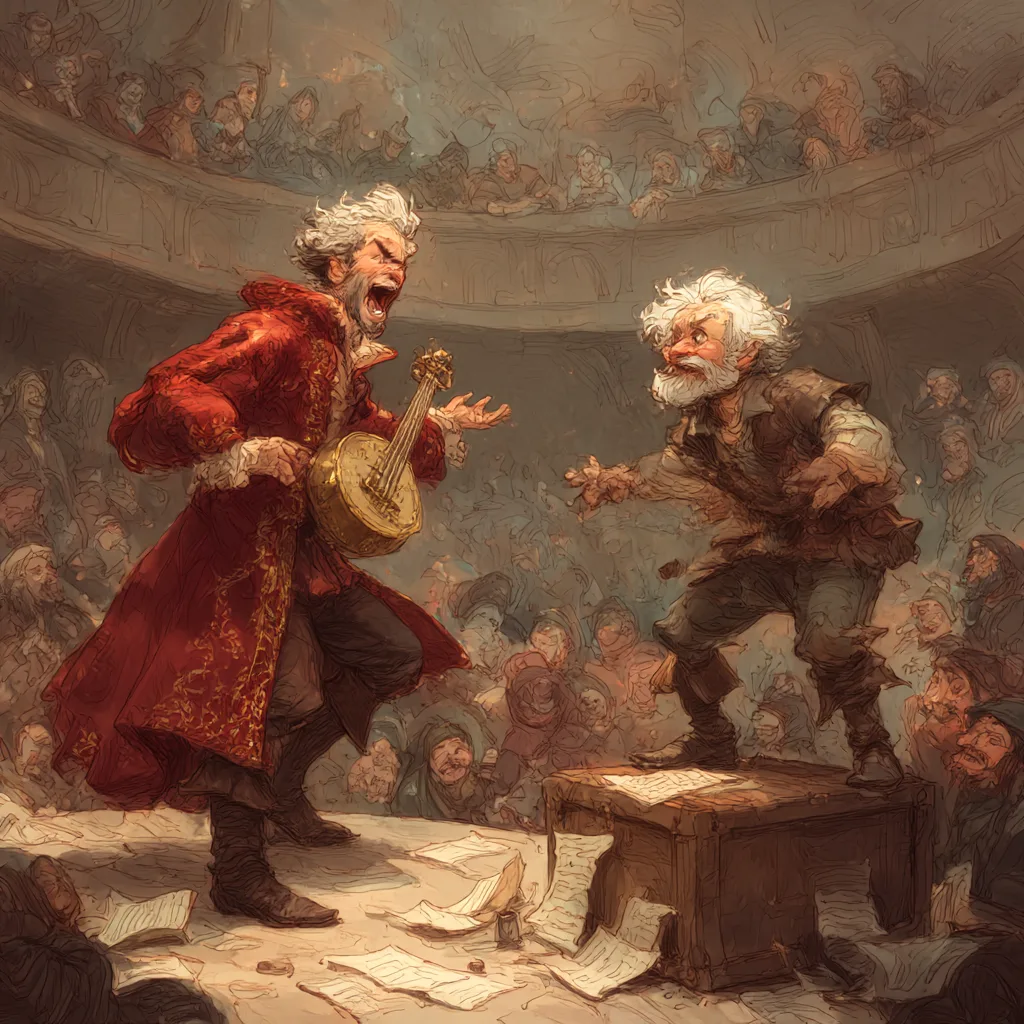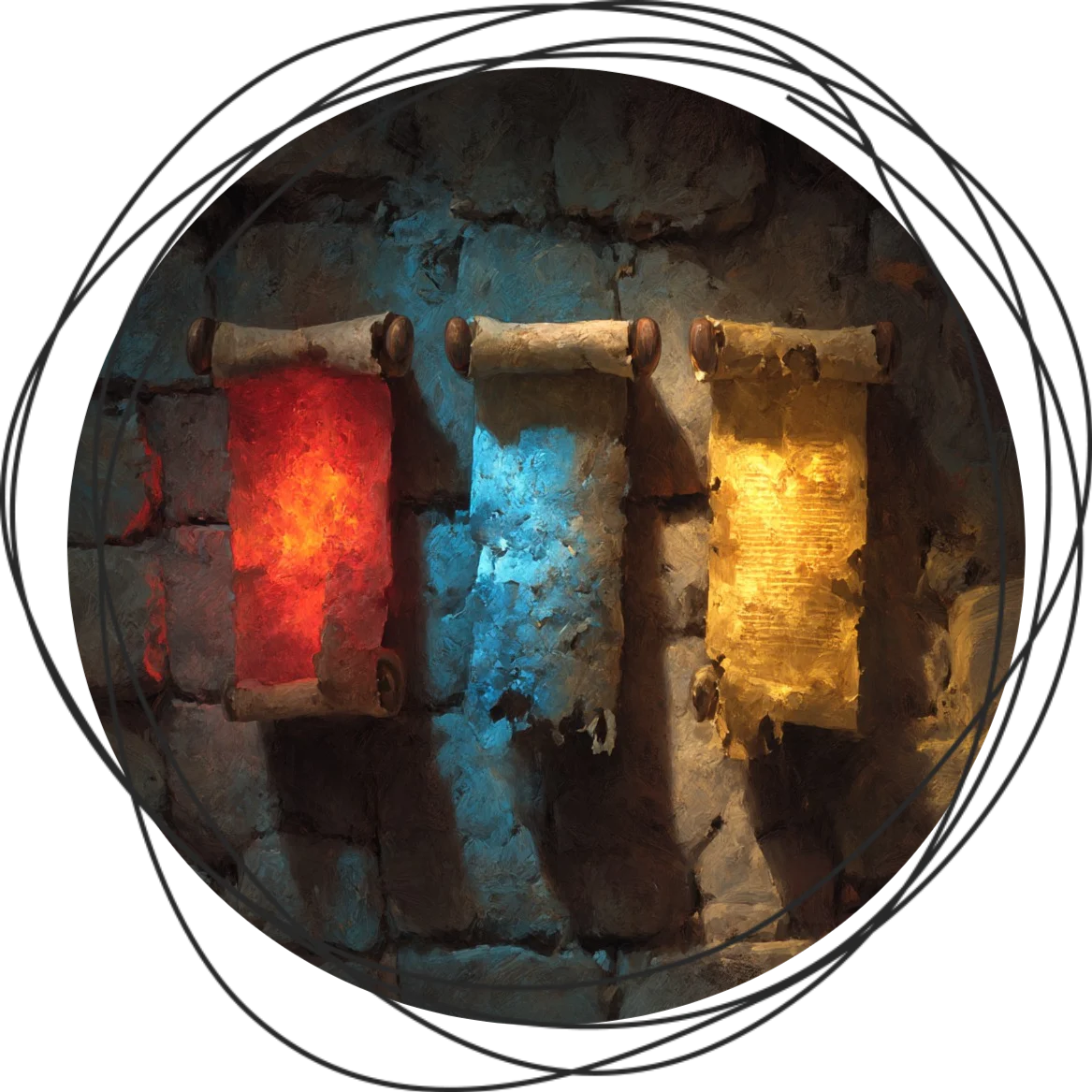The Tales of Lexus
It is said no child in Kena’an is born without hearing the whisper of a Lexus tale before their first winter. Whether sung beside the hearth or murmured beneath the canopy of stars, his stories cling to the world like old roots to stone. Though fairytales form the heart of his legacy, they are far more than mere amusements. They are warnings. They are mirrors. In some, a clever fox teaches mercy; in others, a lonely giant learns the cost of keeping a heart sealed in glass. They are tales that gently place a hand upon your shoulder and ask, “Will you do better”?
“Long before the gods had temples, children had stories. And before those stories had names, they had Lexus.”— Oriric Cherrybottle, Bard Extraordinaire
Scraps of his manuscripts, their ink faded like breath on a mirror, have been salvaged from the ruins of Elenestra. These fragments - scrawled in a meticulous hand, sometimes marked with what appears to be marginal doodles or musical notations - offer proof that Lexus penned at least some of his lore. And yet, it is the oral tradition that gave his words their wings. Across valleys and coastlines, the same stories twist and bloom in a thousand tongues, each telling slightly different, all unmistakably his.

Not all of his work was fable though. Many of the great myths - those explaining the making of mountains, of peoples, of stars - owe their poetic voice to his pen, even if the truth they carry predates him. One such example is the tale of Aerith: Daughter of the Earth and the Sky, that speaks of how the Aerithia Archipelago came to be. It is this account of the myth, preserved on a weatherworn scroll bearing his clearest surviving signature, that many believe marked the true beginning of his lifelong work: to shape not just stories, but a storytelling world.
He never wrote of himself, at least not directly. But some claim to hear his footsteps in the wanderers he wrote of: the lantern-bearing woman who never aged, the elven boy who traded his name for a song, the man who spent a lifetime collecting broken promises to fix them.
Pale tales
In the centuries following Lexus’ death, a tide of stories surfaced, falsely attributed to him. These so-called Pale Tales mimicked his style, but not his soul. They praised compliance, punished curiosity, and ended with moral clarity so sharp it dulled the heart. Unlike Lexus’ true work - where endings were sometimes broken, bittersweet, or incomplete - the Pale Tales sealed their lessons in wax and gold. Characters who disobeyed their elders were punished. Authority was unquestioned. Kindness became a transaction.
Some were passed off as “newly discovered scrolls,” often found in caves, temple ruins, or the bottom of a traveling pack. Others bore grandiose titles like The Unfound Hymnal or The Hidden Ember Codex, names designed to dazzle, not resonate.
“They copy his shape, but cannot carry his silence. There is no risk in their pages, no tenderness. They wear his name like a stolen mask. It's honestly too easy to see throught their forgeries.”— Oriric Cherrybottle, Bard Extraordinaire
Gilded Tongues
Not all who challenge Lexus do so with deception. Some do it openly, in opulent halls, noble gathering and bardic symbosiums. Rival bardic orders - especially the one controlled by the noble House of Maereth in Keraian, or the Tel Virel Conservatory in Zolirak - actively seek to diminish Lexus by branding him a lowborn or and unschooled improviser. His lack of formal apprenticeship, they claimed, made his work unworthy of record. Instead, they lifted his structure for their own use; refined, polished, stripped of ambiguity.
One of the most infamous exchanges between Oriric and a rival bard occurred at the Emberlight Symposium in Vandoria, where Lord Halcor of House Maereth publicly denounced Lexus as a symbol of peasant sentimentality.
The Emberlight Symposium is meant to be a gathering of minds, held each year within the fragrant halls of Vandoria's Silver Amphitheater. Civility is the expected rule. But that night in 954 ADA, civility left the building.
Lord Halcor of House Maereth, clad in embroidered velvet and thick with the weight of his own arrogance, had just delivered a speech carefully crafted to belittle Lexus and his followers. He dismissed the stories as “charming, if crude,” the author as “likely fictitious,” and his admirers as nothing more than a “cult of sentiment.”
When he paused, expecting applause, a single voice erupted from the back, sharp and mocking like a blade through silk.
“Ah, there it is! The noble tongue twisting truth again. Don’t be a woose, Halcor. Just say you’re sour the poor dared to dream without a sponsor.”
The amphitheater froze. Nobles shifted uncomfortably in their seats. But Oriric, boots still dusty from the road and a cracked flute swinging at his belt, rose and strode forward with a confident smile lighten up his bearded face. Halcor sneered, “What do we have here? The feral priest of peasant fables honors us! You came to spit your silly rhymes, or just spit?”
Oriric’s smile widened, teeth gleaming like a wolf’s. “Neither. I came to see if you’d choke on your own quill. So far? Disappointing.”
A hush fell. Some bards whispered approval; others edged toward the exits. Halcor’s voice sharpened in response. “We’re here to discuss quality. Lexus wrote indulgence. Soft stories. Lies disguised as lullabies. Children need rules, not riddles.”
Oriric’s reply was calm but fierce. “No, Halcor. You miss the mark. Again. Children need curiosity: a fire that doesn’t burn them. They must learn the world is cruel, and still be kind. Lexus gave them that. You want to hand them chains and call them garlands.”
Halcor’s face flushed, fury boiling beneath his polished exterior. “You romanticize a myth. Lexus was no scholar. No master. No one.”
Oriric’s laugh was low and sharp. “Exactly. And yet, he still outsang your entire bloodline.”
A goblet shattered on the floor. A ripple of shocked gasps and nervous laughter spread through the crowd. Now crimson-faced, Halcor shot back, losing his composure, “His tales contradict themselves. In one, defiance is noble; in the next, it kills. Where is the message?”
“Life doesn’t rhyme, Halcor. Why should stories?”
Without wasting another word, Oriric turned and left the stage.
The symposium ended early that year. No official record was made of the clash, but by dawn, half the city had heard the story.
The Banned, the Lost & the Disputed
“Lexus did not write to comfort us. He wrote to remind us that truth, like love, is rarely convenient.”— Oriric Cherrybottle, Bard Extraordinaire
The Love that burned through Ice
Of all the tales suppressed in the centuries that followed Lexus' vanishing, none stirred more fury than
The Love that Burned through Ice. The tale tells of a forbidden romance between an elven woman and a
Glaciarc, a towering, semi-giant being native to the frozen north; an enemy of both elves and humans.
It’s a deeply tender, tragic story that ends in mutual sacrifice. Many clergy and generals denounced it as “treasonous propaganda,” interpreting the story as an endorsement of racial betrayal and fraternization with monsters. Later versions reframe the Glaciarc as a human noble cursed into beastly form, diluting the transgressive message into a moral about redemption through love. Oriric Cherrybottle likes to call these edits “sentimental cowardice.” To this day, there are places where the original is told only in secret, voice hushed, fire dimmed.
The Orchard & the Seven Winters
And on the seventh winter’s breath, the orchard bloomed anew,
Though sun had died, the sky was gray, and cold winds sharply blew.
He sang her name through roots and bark, a song both deep and true,
Till dusk arrived and fruit was born, of memories’ gold hue.
Of all of Lexus’ missing works, this is the most longed for, and the least intact. Only a single stanza remains, scribbled in the margins of a ruined, ancient bestiary. Nothing else endures but this verse. Yet even this fragment, this ghost of a poem, was enought to spark endless conversation in bardic circles and across generations of storytellers. Some say it was the end of a cycle; perhaps Lexus’ farewell to a lost beloved. Others claim it was never finished, interrupted by illness or some other calamity. A few - Oriric among them - insist that it was deliberately discarded, its contents too personal to share.
The Lamb beneath the Sea
The Lamb Beneath the Sea is a tale not directly attributed to Lexus, but so widely associated with his style that it has become part of debate.
In it, a mute child follows dreams of a drowned kingdom and dives into the sea each night to visit a place no one else can see. She is guided by a talking lamb with eyes like coral. Each night she descends deeper, and the kingdom becomes clearer, populated by the memories of the dead. Eventually, she finds her own name etched on the walls and never returns to the surface.
The story is dreamlike, terrifying, and lacks Lexus’ usual clarity of voice. There’s no overt moral, and the tone is colder. Still, the prose is unmistakably beautiful, and its themes of memory, death, and otherness is very close to Lexus' style. Some say it’s a masterwork of one of his apprentices. Others believe it was Lexus’ attempt at writing from the perspective of a haunted mind, an early abandoned exploration of grief.
Oriric's Favorites
Among the many stories woven into the fabric of Kena’an by Lexus, there are three that the magnificent bard and founder of the S.H.I.N.E. academy, Oriric Cherrybottle carries with him always; tales that appear in nearly every performance and gathering he holds. These stories hold a special place not only in his heart but in the hearts of those who hear them, passing down lessons of love, loss, forgiveness, and hope through the ages.
The gardener teaches us that grief is no enemy to be conquered, but a patient companion who, if listened to, will lead us to renewal. Each stage, a season of the soul, and with patience, the barren ground yields fruit again. It’s a tale for all who have lost and dared to hope again.
A story of a love forbidden by blood and fear, yet fierce enough to carve its own path through the coldest winter. It’s a reminder that love does not ask permission, and sometimes the bravest act is to hold a hand when all else would turn away.
Forgiveness is the hardest magic to weave, and this tale sings its song with fire and feather. The girl cast out, the land laid to waste, and the fiery rebirth that followed. This is a story not just of justice, but of mercy and the healing nature of forgiveness.
The Vision of the Storyteller
Lexus was a visionary who believed in the power of stories, not just to entertain, but to inspire, to awaken the restless hearts of children and elders alike. His tales planted seeds of curiosity, kindness, and courage where once only fear and obedience grew.
In a world fractured by war and shadow, Lexus dared to imagine a future shaped by compassion and questioning minds. His stories, whispered at firelight and carried on the wind, remind to all who hears them that the next chapter is never written by the past alone.
For those who listen closely, his legacy is clear:
The future is not a path carved by gods or kings, but a story we write together: one word, one hope, one seed at a time.
Wait, what is that? A second ending? But no one likes second endings!
Well, well, you’ve stumbled upon my little secret?
Bollocks! There’s no point playing mysterious at this stage, is there?
It’s me:
Boo: Your guide to the afterlife! Yes, the cosmic janitor, your ever-sassy psychopomp, the bane of lost souls and patron saint of dramatic exits.
You thought Lexus was gone, didn’t you? Ha! Legends don’t disappear, you silly pie! Turns out I just upgraded my gig. That’s right, the man behind the stories is me.
Don’t look so shocked. Have some tact.
I know I look a bit skeletal, but cut me some slack. Let’s see how you hold up after a few centuries dead. Then we’ll talk.
Anyway, where was I?
Oh yes, turns out, the greatest storyteller never really left the tale.
And that's all you need to know! Why are you still staring?
Come on, off you go. I didn’t spin all these stories just to have you lingering around asking for more.
They weren’t meant to end with me.
They were meant for you.
Take them. Twist them. Tell them.
Make something new.
Now shoo! I am busy!
















The signature is a lovely detail. It's nice that we finally get to meet the character behind the wonderful stories. And I hadn't thought of a car brand. When I read Lexi, I actually had to laugh, because I originally wanted to give the children in my novel similar names. I'll remember what the community says, since people usually choose names because they either have a certain sound or already have a certain meaning. Thank you, a very inspiring article.
Here are my Entries for the water continent Ulűri̋qi̋
I am amazed of how close our thinking is, even when it comes to names! "Lexi" is the actual term for word in greek, that's how I decided on the name Lexus :) I am very glad you liked him! I can't wait to write some more of his fairy tales